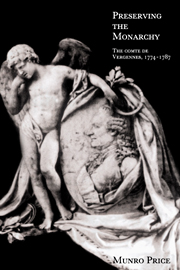Book contents
- Frontmatter
- Contents
- Acknowledgements
- List of abbreviations
- Introduction
- 1 Recalled to life
- 2 The question of reform: Turgot, Necker, and Vergennes
- 3 Vergennes as first minister: the comité des finances
- 4 The fall of the comité des finances
- 5 The politics of judicial reform
- 6 The politics of retrenchment, 1783–1785
- 7 The ministry, its divisions, and the parlement of Paris, 1785–1786
- 8 The Dutch imbroglio
- 9 Death and posterity
- Bibliography
- Index
2 - The question of reform: Turgot, Necker, and Vergennes
Published online by Cambridge University Press: 31 October 2009
- Frontmatter
- Contents
- Acknowledgements
- List of abbreviations
- Introduction
- 1 Recalled to life
- 2 The question of reform: Turgot, Necker, and Vergennes
- 3 Vergennes as first minister: the comité des finances
- 4 The fall of the comité des finances
- 5 The politics of judicial reform
- 6 The politics of retrenchment, 1783–1785
- 7 The ministry, its divisions, and the parlement of Paris, 1785–1786
- 8 The Dutch imbroglio
- 9 Death and posterity
- Bibliography
- Index
Summary
The Guines affair and the guerre des farines marked the first political crisis of the reign of Louis XVI. Despite some alarming moments, the king's ministers had successfully withstood a concerted attack from the choiseulistes and the queen. Yet as the turmoil subsided, Maurepas, Vergennes, and their allies faced the same fundamental problem as before. Although a first step had been taken with the restoration of the parlements, much still needed to be done to revive the monarchy's credibility in the eyes of the political nation.
The most difficult issue remained the nature of the royal authority itself. With the recall of the parlements, it could no longer be argued, as it had been between 1771 and 1774, that the absolute monarchy was indistinguishable from a despotism. Attacks on the crown, however, did not cease: they simply changed focus. After 1774, the main evidence for the monarchy's despotic tendencies was no longer to be found in its dealings with the sovereign courts, but in the internal workings of the government itself.
The main target of reformers after Louis XVI's accession was what contemporaries termed ‘ministerial despotism’. The root of this problem was that in the course of the eighteenth century the traditional decision-making apparatus of the monarchy, centring on the king and his council, grew increasingly unable to cope with the growing number of functions it was expected to assume. In the absence of an effective king, council, or any other form of constitutional restraint, power was monopolised by the king's ministers, who were in practice accountable to nobody and were able to take arbitrary decisions virtually unchecked.
- Type
- Chapter
- Information
- Preserving the MonarchyThe Comte de Vergennes 1774–1787, pp. 42 - 60Publisher: Cambridge University PressPrint publication year: 1995

